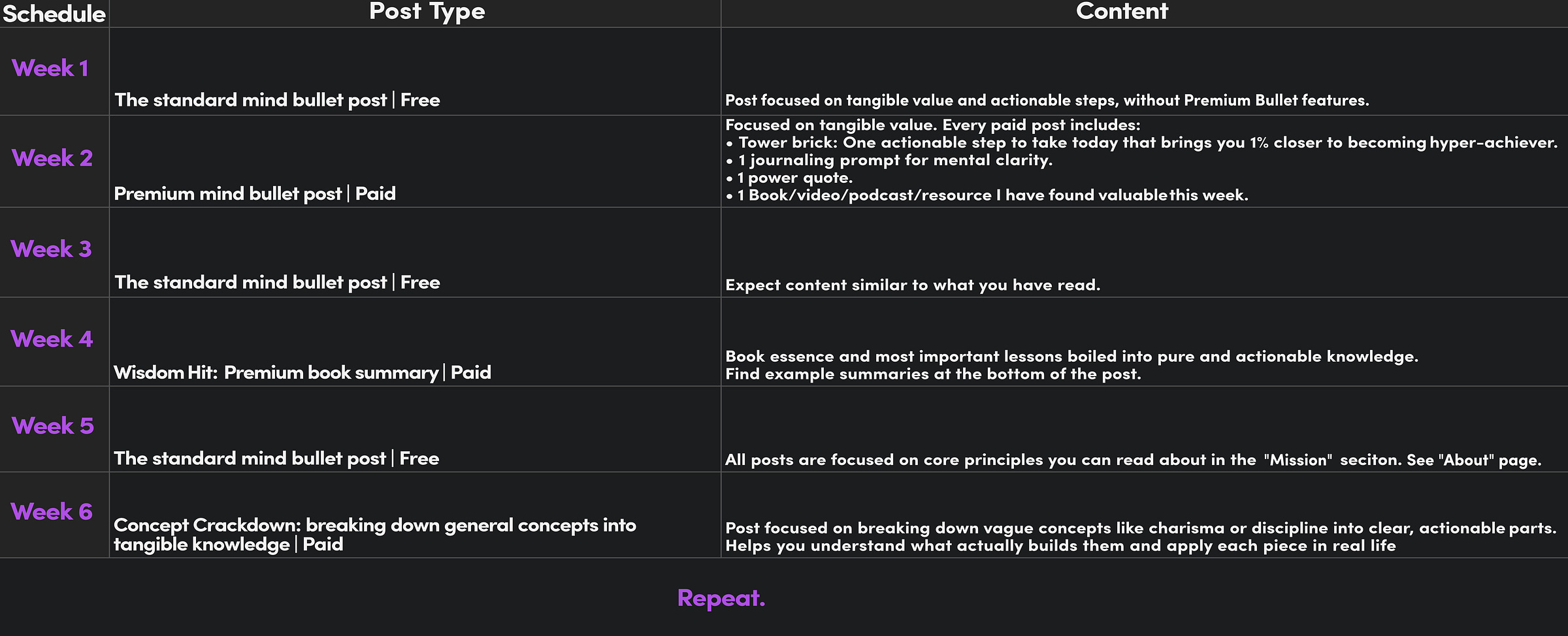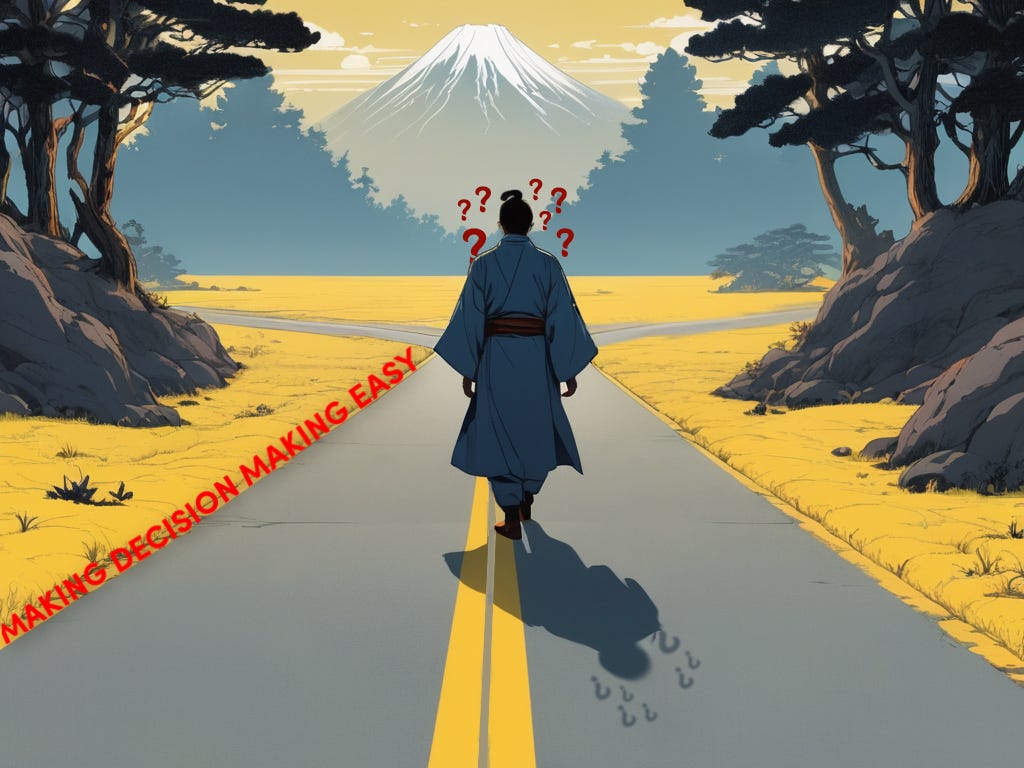Decision Fatigue: The Hidden Killer of Creative Consistency (And How to Eliminate it)
How to save your mana for casting your biggest spells.
If you have your own thing (creative endeavor, business, project that is not externally imposed by school or work), there’s no clear path.
There are no easy decisions, as all responsibility lies on you.
There’s no deadline motivation, you can put something away in time without instant consequences.
There’s a huge FOMO. No matter what decision you make, the other option may have been better.
Combine these, and you get a paralysis that holds you in place.
Why it’s so hard to make decisions
Every morning, you wake up with approximately 70-100 decisions worth of mental energy.
Research from the American Psychological Association shows that with each decision you make, your mental energy depletes.
This isn’t an infinite resource—mental energy is like mana, and you are the mage.
Making decisions can unnecessarily drain your mana that could be allocated in the actual work or fun.
Hitting a mid-project wall is a common struggle.
Mundane decisions you face throughout your day (what to wear, what to eat, which email to answer first) silently drain the mana you need for your most important creative work.
That’s why you want to systematize decisions and save your mana for the biggest spells.
How to make it easier for yourself
A quick framework that will simplify making decisions for you.
Simple number rating gives you a point of reference and comparison.
Let’s put daily decisions into a few categories:
By consequences (scale 1-10)
Based on long-term consequences. Drinking a few beers will make your brain foggy the next day, but won’t ruin your overall flow.
1-3: Minimal impact (what to eat for breakfast, which socks to wear, what movie to watch)
4-7: Moderate impact (whether to attend an optional meeting, daily exercise choices)
8-10: High impact (career moves, choosing software for your business, where to put your money)
List your recurring decisions and rate them. Anything scoring below 5 should be systematized or eliminated. More in “Systems” below.
By complexity (scale 1-10)
Based on how many variables (especially moving ones) you must consider:
1-3: Simple decisions (binary choices, few variables)
4-7: Moderate complexity (several good options, multiple factors, dynamic situation)
8-10: High complexity (many interdependent variables, unclear outcomes, high anxiety, impacts your close environment including other people)
For any decision rated 8+, sit down with a single sheet of paper and sketch everything using words—first step for clarity.
For very complex decisions, use WADM.
This is the idea from the book “The Millionaire Fastlane”. Title sounds like coachish wishy-washy, but it’s a good one. (Amazon affiliate link, I get a small cut if you buy it from here).
By impulsiveness (scale 1-10)
Easiest to fight off. In daily it occurs in shopping more than in anything else.
1-3: Planned decisions (part of your workflow/system, you see value in at least trying it) lowest impulsiveness
4-7: Semi-planned (expected but timing is variable)
8-10: Fully reactive (unexpected, urgent, emotionally driven) highest impulsiveness
See how 8-10 influence your behavior the most.
If you rate something 8-10 and it isn’t urgent, give yourself a week to cool down. If you stick with it, your wallet will be grateful and you won’t feel like a pussy who got manipulated by simple tricks.
Systems to eliminate decisions
The most effective thing you can do to help yourself with indecisiveness is reducing the number of decisions you have to make. Brilliant, I know.
I said that anything scoring below 5 should be systematized or eliminated.
Let’s put it into practice:
1. Answer templates
Getting an unexpected DM during the day can bounce you off the flow. Sometimes it’s really hard to come up with a good (or at least not terrible) answer. Ask me how I know it.
Create ready-made responses for common situations:
Auto responder that answers the FAQ questions. Because you will get them anyway. IGDMBot is good for Instagram. Text Blaze is a great tool too.
Template what you can template. This post is written from my template.
Answer the questions in emails in advance. Close the conversation the first chance so you don’t have to wait for the next email in frustration. That rule was written with 9-5 in mind, I like talking with you here.
2. Decision thresholds
Establish automatic rules to eliminate the need to decide:
"Any purchase under $50 that serves my creative work is a no brainer".
"If a meeting request doesn't align with my top 3 priorities, it's an automatic no".
"If I'm invited to something less than 48 hours in advance, default answer is no".
If you were invited last, they don’t really want you there. It doesn’t apply to everything, but you have your own brain, I don’t have to explain it.
3. Batch
You likely heard about batching tasks (from previous issues for example). Do the same with decisions.
Group similar decisions together:
Meal planning: Decide on an entire week's meals on Sunday. I know it’s common advice, but I caught myself deciding what to eat for way too long way too many times to not mention it.
Content calendar: Plan all your content topics for the month in one session. I have a Notion page with post ideas and use Metricool for scheduling on socials.
Outfit planning: Select your clothing for the full week ahead. If not this, at least prepare your clothes day before. Hide all clothes wandering around your room and leave only the next day's outfit. Don’t mix used T-shirts with clean ones though, or put them in a separate drawer.
4. Environmental Design
Set up your space to remove decisions:
Only essential tools visible. Clean and organized. Sacrifice one day so you don’t have to spend 20 minutes searching for small things next time when you are in a hurry.
Digital environment has distractions blocked during creation hours. See the last issue.
No clutter in general. Organize once, decide less daily.
FUEL YOUR CREATIVE SUCCESS
Set your goals step-by-step with my Pathfinder Goal-Setting Template! (free for all subs, claim in welcome email)
Build a habit that sticks in 40 days with the See Yourself Growing Habit Tracker! (free for paid subs in digital)
Take charge of your mental well-being with Short Practical Guide to Mental Health! (free for paid subs in digital)
Become a hyper-achiever! Your subscription directly fuels new content!
AchievR is run solely by me. Support the creator!
Big shout out to Sarah and… Sarah! New premium subscribers of AchievR! You are allowing me to write these words. If you haven’t subscribed yet, join 5404 hyper-achievers for free!
Any suggestions? Give me feedback here:
To read next:
This is the first post from the new schedule (Week 1), next up:





